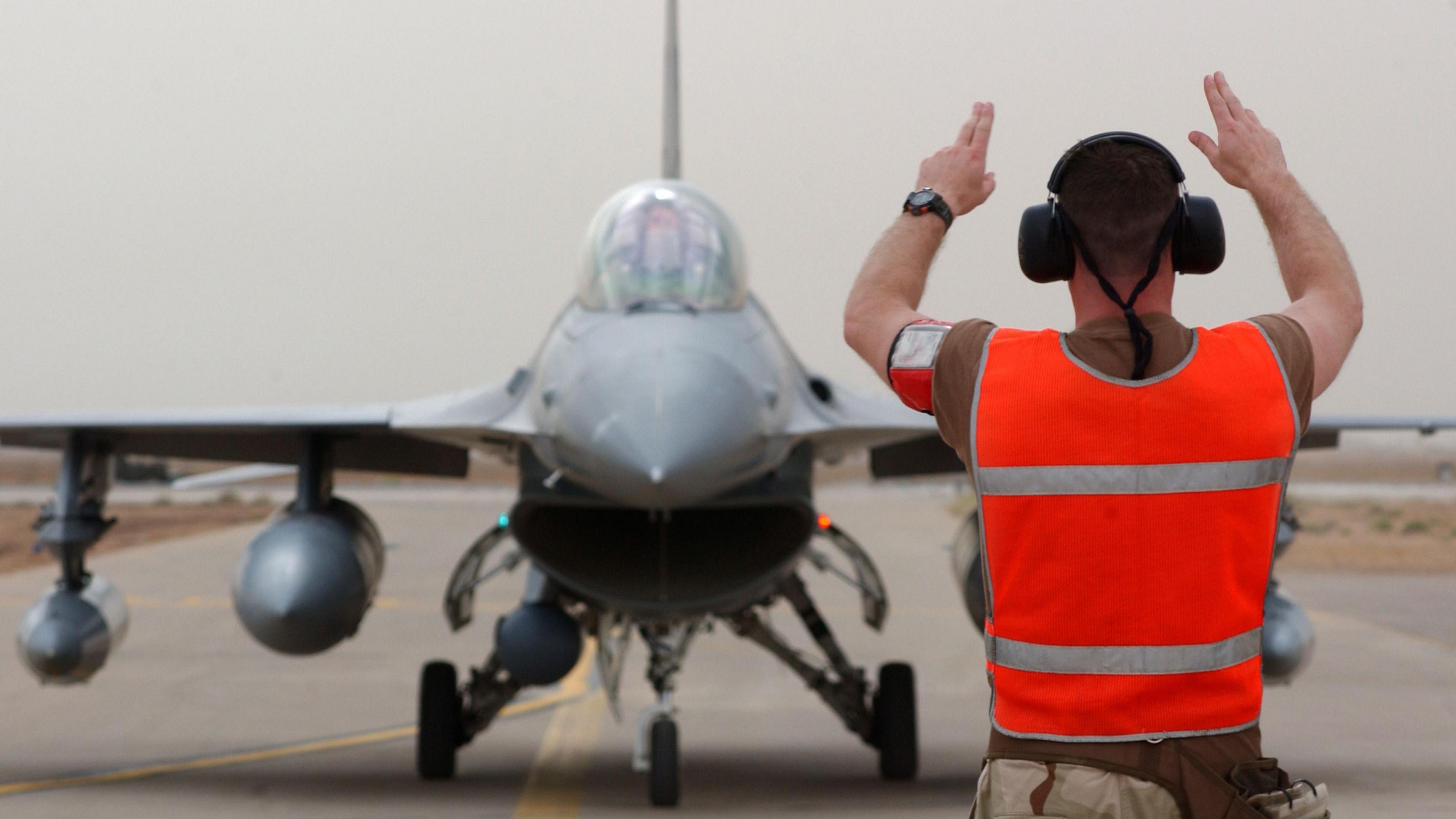US to send jets and warships as Iran threatens Israel

- Published
The US will deploy additional warships and fighter jets to the Middle East to help defend Israel from possible attacks by Iran and its proxies, the Pentagon said.
Tensions remain high in the region over the assassination of Hamas leader Ismail Haniyeh in Iran and a key commander of the Lebanese militant group Hezbollah.
Missile defence forces were placed on a state of increased readiness to deploy, the Pentagon said, adding that its commitment to defend Israel was "ironclad".
Iran's leader Ayatollah Khamenei has vowed "harsh punishment" against Israel for the assassination of Haniyeh.
The Hamas leader was killed in Tehran on Wednesday. Iran and its proxy in Gaza blamed the attack on Israel, which has not commented.
Haniyeh, 62, was widely considered Hamas's overall leader and played a key role in negotiations aimed at reaching a ceasefire in the Gaza war.
His death came just hours after Israel claimed it killed Fuad Shukr, the top military commander of Iran's proxy in Lebanon, Hezbollah.
A Pentagon statement said the new deployments would "improve US force protection... increase support for the defence of Israel, and ... ensure the US is prepared to respond to various contingencies".
The deployments would include additional ballistic missile defense-capable cruisers and destroyers, it said.
Bowen: Israel's killing of Haniyeh deals hammer blow to ceasefire prospects
- Published31 July 2024
'Still alive' - graduate Asmaa's texts to BBC from the ruins of Gaza
- Published3 August 2024
Hezbollah leader says conflict with Israel in 'new phase' after killings
- Published1 August 2024
High alert
On Tel Aviv’s seafront, the mood appears relaxed with bronzed bodies lazing under beach umbrellas.
But few are in any doubt that the Middle East stands perilously close to full- scale war.
Israel is on high alert.
Several international airlines have suspended flights to the country.
Meanwhile, Israeli ministers were sent home this weekend with satellite phones in case of an attack on communication infrastructure.
Earlier on Saturday, Israeli forces killed a Hamas operative in the West Bank.
Dozens of Palestinians were reported to have been killed in strikes on Gaza in the last 24 hours - a reminder that Israel’s war in the region continues even as diplomats scramble to prevent its escalation.
The US military has stepped-up deployments before, on 13 April when Iran launched an attack on Israel with drones and missiles. Israel and its allies shot down almost all of roughly 300 drones and missiles that were fired.
Israel has not commented directly on the strike which killed Haniyeh. But Prime Minister Benjamin Netanyahu said his country had delivered "crushing blows" to its enemies in recent days, including the killing of Shukr in Beirut.
He warned Israelis that "challenging days lie ahead... we have heard threats from all sides. We are prepared for any scenario".
Earlier, Pentagon spokesperson Sabrina Singh said the US did not believe escalation was inevitable.
"I think we are being very direct in our messaging that certainly we don't want to see heightened tensions and we do believe there is an off-ramp here and that is that ceasefire deal," Singh said.
An Israeli delegation will travel to Cairo in coming days for negotiations to reach a Gaza ceasefire and hostage release deal, Mr Netanyahu said on Friday.
Hamas sparked the war with its 7 October attack on Israel, which killed 1,200 people. Israel responded with an ongoing military operation in Gaza that has killed almost 40,000 people, according to the Hamas-run health ministry.
The circumstances surrounding Haniyeh's death are, as yet, still unclear.
On Saturday, the Daily Telegraph, external reported that Iranian agents hired by Israel's Mossad spy agency had planted bombs in a building where Haniyeh was staying.
The newspaper says that two agents placed bombs in three rooms of an Islamic Revolutionary Guard Corp guesthouse in Tehran, which were detonated from abroad.
An earlier report by the New York Times, external said that the bombs had been snuck into the building two months earlier.
The BBC has not been able to verify these claims.